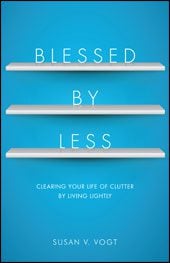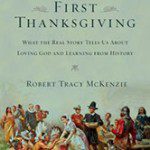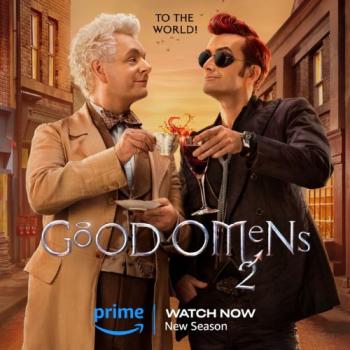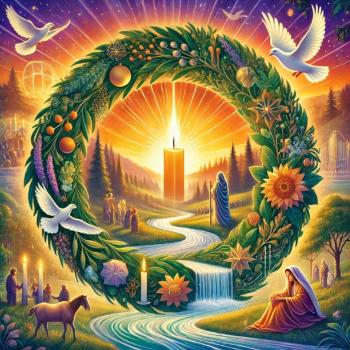 As I read Susan Vogt’s Blessed by Less: Clearing Your Life of Clutter by Living Lightly, I was confronted with the challenges of living simply in a complicated world. While I don’t live extravagantly or have fewer professional demands than many urban and suburban parents with children, twenty-first century middle class living is extravagant and cluttered by comparison to any previous time. It is clear that what we deem necessities were luxuries in an earlier era. I don’t want to go back to a “simpler time” and yet I recognize that with the ease and ability of my lifestyle, whether in terms of technology, domestic life, or travel, comes complications and stresses unimaginable to previous generations or persons in developing nations. Let me share a curious example from my own life as a way of illuminating Vogt’s thesis.
As I read Susan Vogt’s Blessed by Less: Clearing Your Life of Clutter by Living Lightly, I was confronted with the challenges of living simply in a complicated world. While I don’t live extravagantly or have fewer professional demands than many urban and suburban parents with children, twenty-first century middle class living is extravagant and cluttered by comparison to any previous time. It is clear that what we deem necessities were luxuries in an earlier era. I don’t want to go back to a “simpler time” and yet I recognize that with the ease and ability of my lifestyle, whether in terms of technology, domestic life, or travel, comes complications and stresses unimaginable to previous generations or persons in developing nations. Let me share a curious example from my own life as a way of illuminating Vogt’s thesis.
This summer we moved to our new home on Cape Cod, where I pastor South Congregational Church in the beach village of Centerville. Moving is always a spiritual wakeup call in which you discover the gap between how much you own and how much you need. You also discover how difficult it is to let go of “prized,” but unused, possessions. It’s now the week before Thanksgiving and, after five months on the Cape, I’m finally getting around to unpacking several of the thirty or more boxes of books that have been lingering in our unfinished basement since our move. I’ve already filled the bookshelves at my church study, and now it’s time to do the same with the new bookshelves in our great room at home. After this task is completed, I will still have about twenty boxes of books left over. This is obviously a logistical issue but it is a spiritual issue as well. You see, I’m an academic pastor and books are the tools of my trade. Even if I haven’t turned the pages of a text in ten years, it still represents time spent in research or pleasure reading, and these texts are tough to give up. In the academic world, books are a status symbol: the larger the library, the more erudite you must be as a scholar in your field. I may not have anywhere to put them but I don’t want to give them up!
By now, you see my quandary. I must do one of the following: 1) buy more bookshelves for the currently unpacked books, 2) give away the books (and some are of little value to anyone but me, and are not likely to be wanted by the local used book store in Hyannis), or 3) leave them in boxes in the basement till I move again in a decade or more (at which time, they will find a new home in another storage place!). Now this isn’t that serious to be honest: I could give half of these books away – and I am donating some to our church’s “Thrifty Niche” store – or simply leave them downstairs without missing them. But, they’re my books and they have sentimental, if not research, value. They represent my life as a student and then scholar-pastor for over forty years.
The Quakers use the term “cumber” to describe the excesses of our lives. The reality of “cumber” is a reminder that we can make an “examen” or “examination of conscience,” regarding what’s really important to us. It invites us to ask ourselves, “Do we possess our possessions or do our possessions possess us?” This is the heart of Vogt’s Blessed By Less. It suggests that most of us have a “weight problem” – we have too many things, eat too much, do too much, and fill our lives with too much physical, emotional, material, and programmatic clutter. Our time-saving conveniences (computers, cell phones, copying machines, and so forth) have only made life more complicated and threaten the relational values we most cherish.
The issue is simplicity of life, but the quest for simplicity must be fluid and flexible, not legalistic, in nature. Mindfulness is a key first step toward simplifying your life. Be aware of how you spend the time of your life and your attitudes toward time, talent, and treasure. In the spirit of the monastic process of examination of conscience, regularly ask throughout the day, “What’s important to me in this situation? What will make me happy? Is this decision congruent with my value system and spiritual priorities?” While few people will choose to follow Vogt’s rigorous approach to letting go, most of us can find a daily middle ground practice.
Ultimately the question is: “What gives me joy? What brings happiness to others?” The answers to most of these questions involve personal spiritual growth, health and well-being, and healthy relationships. The answers also involve discerning what to embrace and what to let go – in terms of possessions, habits, lifestyle, memories, and relationships – and our answers come from an ongoing commitment to joining contemplation and action.
It is Advent, and when I finish unpacking a few more boxes, my new bookshelves will be filled. Twenty or so boxes will remain in the unfinished storage area of our basement. While I won’t feel bad about that and am planning to winnow down my book collection over the next few months, the Advent message is a reminder to those possessed by their possessions: Stay awake! Be ready! Don’t be so weighed down by the cares of life that you miss Christ’s coming in the Holy Here and Holy Now.














